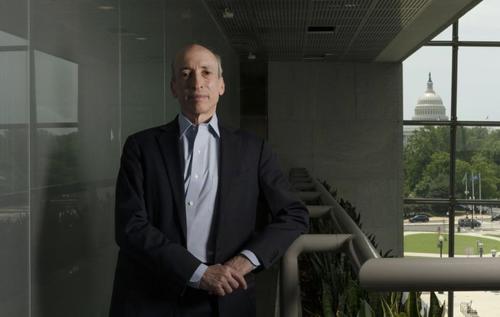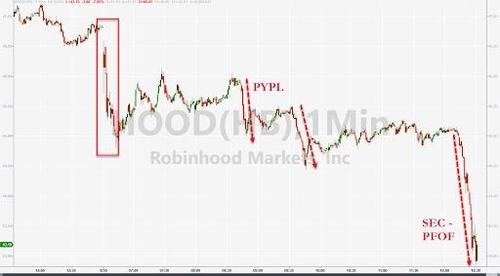Robinhood Tumbles As SEC’s Gensler Says Payment-For-Order Flow Ban Is “On The Table”
Monday has been a tough session for Robinhood.
Earlier, reports that PayPal was exploring launching its own stock-trading venue helped to hammer shares of Robinhood and Schwab. Now, with just minutes left in the trading day, the SEC has signaled that a potential ban of ‘payment for order flow’ – aka the controversial practice that’s at the core of Robinhood’s business model – is back on the table.
A few weeks ago, Fox Business’s Charlie Gasparino reported that the SEC had caved on its plans to ban the practice. At the time, we advised that readers should take Gasparino’s report with a grain of salt, given its source.
Now, it looks like he got it wrong: the SEC – which is looking to raise its profile with Gary Gensler now in charge – is signaling that it’s ready to listen to Robinhood’s critics, no matter how much money the company raised during its IPO.
Gensler said as much during an interview with Barron’s that was published Monday afternoon. Gensler explained that PFoP creates “an inherent conflict of interest” something which the practice’s critics (including Zero Hedge) have been saying for a long time.
In an interview with Barron’s on Monday, SEC Chairman Gary Gensler said that a full ban of payment for order flow is “on the table.” Payment for order flow is a practice where brokers send trade orders to market makers that execute those trades in return for a portion of the profits.
Gensler says the practice has “an inherent conflict of interest.” Market makers make a small spread on each trade, but that’s not all they get, he said.
“They get the data, they get the first look, they get to match off buyers and sellers out of that order flow,” he said. “That may not be the most efficient markets for the 2020s.”
He didn’t say whether the agency has found instances where the conflicts of interests resulted in harm to investors. SEC staff is reviewing the practice and could come out with proposals in the coming months.
Gensler has mentioned several times that the U.K., Australia, and Canada forbid payment for order flow. Asked if he raises those examples because a ban could also happen in the U.S., he replied: “I’m raising this because it’s on the table. This is very clear.”
Gensler added that the PFoP problem is part of a greater issue of dwindling market transparency, with dark pools and other factors also tied in.
“Also on the table is how do we move more of this market to transparency,” he said. “Transparency benefits competition, and efficiency of markets. Transparency benefits investors.”
Payment for order is part of a larger issue with market structure that Gensler is trying to solve. He notes that about half of trading is in dark pools or is internalized by companies that keep those trades off exchanges. Even some of the trading that takes place on exchanges is opaque — and exchanges are paid through rebates that are similar to payment for order flow. Opaque markets where different investors have their trade orders processed differently have the potential for abuse.
“It provides an opportunity for the market maker to make more, and for ultimately the investing public to get a little less when they sell, or have to pay more when they buy,” he said. “I think it also affects companies raising money,” he added, because it could be a barrier to “fair, orderly and efficient markets.”
Shares of Virtu and other high-frequency traders also tumbled on the news.
Investors will be eager to hear more about this from Gensler. Expect a slickly-produced Vox-inspired explainer video to be shared on the SEC’s social media feeds in the not-too-distant future.
Tyler Durden
Mon, 08/30/2021 – 15:47
via ZeroHedge News https://ift.tt/3gOaSz8 Tyler Durden

